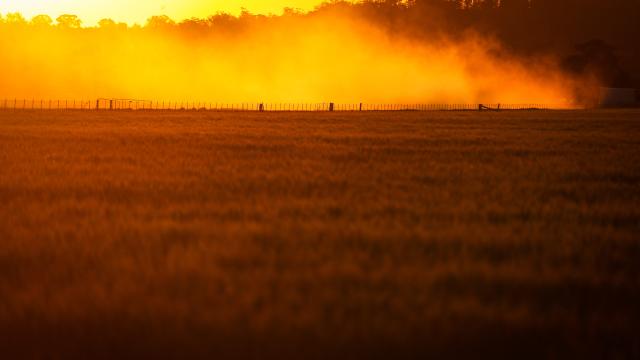As both the coronavirus pandemic and the climate crisis provoke your anxieties, it’s important to remember all of the world’s wonderful possibilities. Which is why I present you: the impacts of nuclear war.
A large-scale nuclear war is a nightmarish scenario that could kill millions of people instantly. According to a new study out in the Proceedings of the National Academy of Sciences on Monday, even a relatively small nuclear conflict between India and Pakistan would surely bring about global famine.
“Indirect effects of even a ‘small’ or regional nuclear war could lead more fatalities due to food shortages than due to direct effects of the war,” Jonas Jägermeyr, a postdoctoral scientist at the NASA Goddard Institute for Space Studies who led the study, told Earther in an email.
The authors assessed the impact of a relatively modest nuclear conflict—just 50 nuclear detonations each from India and Pakistan, no biggie! Each country is actually thought to have 150 at their disposal. India and Pakistan also may well have bombs far bigger than the ones the scientists use in their assumptions.
“Today’s increasing arsenals and weapon sizes in South Asia render this a conservative overall estimate,” said Jägermeyr. Great.
Even under a conservative estimate, the explosions from detonating nukes would shoot a massive amount of black, powdery soot into the atmosphere, where the study suggests it would spread out globally and remain for 10 to 15 years. That soot would block out sunlight and cool the average surface temperature of the Earth by about 1.8 degrees Celsius for at least five years, making it impossible for many crops to grow.
“Slightly reduced temperature could be beneficial for some crops in the tropics, but the negative effects at higher latitude are much worse,” Jägermeyr said.
In addition to lowering the temperature, the soot would also lower the amount of solar radiation reaching the Earth’s surface and, especially in higher latitude areas. That would create shifts in precipitation and reduce sunlight, both of which would harm crop productivity.
Together with temperature, these three shifts in growing conditions would have the worst effect on crops in the world’s breadbasket regions in the north, including the U.S., Canada, Europe, Russia, and China, where temperatures are lower and growing seasons are shorter to begin with. The scientists project that production of the world’s four main cereal crops—maize, wheat, soybeans and rice—would drop by an average of 11 per cent over the five-year period after a theoretical small-scale nuclear war. The effects would then taper off, but full recovery wouldn’t be possible for another 5 or ten years after that.
Even though crops in northern regions would be hit hardest, the Global South, including Africa, the Middle East, and Latin America, would face much more hunger. Developing countries are dependent on exports from developed ones, which produce huge surpluses. If crop production plummeted, northern nations would likely impose export bans to protect their own populations. That means the losses in crop production would impact the entire global food trade system. The study projects that for five years, some 70 poor countries that are home to a cumulative population of 1.3 billion people would see food supplies fall by more than 20 per cent. Many of those countries such as Somalia, Niger, Rwanda, Honduras, Syria, Yemen and Bangladesh already face severe food insecurity, so the effects would be catastrophic.
The authors excluded India and Pakistan to avoid having to quantify the direct effects of the war. But the two nations both produce a considerable amount of the world’s rice, underscoring again just how conservative the study is.
For a small taste of what this could look like, Jägermeyr said to look at what coronavirus panic has done to resource availability. “We are looking at a different underlying cause here, but food availability constraints, panic buying, and price usury would also be a result of the nuclear conflict—only more severe and longer lasting, for multiple years,” he said.
The study is the first one to show that the effects of this sudden global cooling would actually be worse for global crop production than global warming. Since the cooling would be abrupt, there would be little time for food producers to adapt by, for instance, switching to other crops or developing more resilient plant varieties. In addition, while the current climate crisis mostly affects the tropics where little food is produced, this would hit the world’s breadbasket hardest.
Importantly, the report shows that there’s no way a nuclear conflict would have only local impacts.
“There is no such thing as a contained regional war,” said Jägermeyr.
